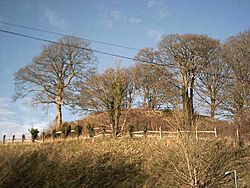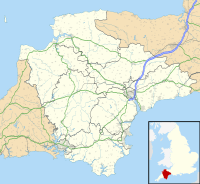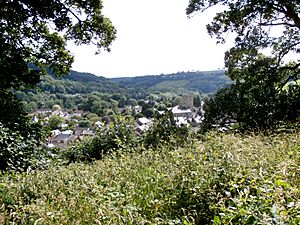Bampton Castle, Devon facts for kids
Quick facts for kids Bampton Castle |
|
|---|---|
| Bampton, Devon, England | |

Remains of motte
|
|
| Coordinates | 50°59′33″N 3°29′05″W / 50.99245°N 3.48467°W |
Bampton Castle was an important castle in the village of Bampton, Devon. It was the main home for the powerful family who controlled the area, known as the feudal barony of Bampton. The castle was built on a high piece of land that looked over the River Batherm.
Contents
History of Bampton Castle
Bampton Castle has a long and interesting history, going back to ancient times.
Early Beginnings: Saxon Times
Long before castles as we know them, people in Saxon times built a simple defensive mound here. This mound helped protect the area.
Norman Conquest and First Castle
After the Norman Conquest in 1066, a new ruler took over. The land and its buildings were given to a knight named Walter Douai. He arrived in the area by 1086.
Walter, or maybe his son Robert, built the first real castle. It was a simple but strong type of castle called a motte and bailey.
What is a Motte and Bailey Castle?
A motte and bailey castle had two main parts:
- A motte was a large, tall mound of earth. At Bampton, this mound was about twelve meters high.
- A bailey was a fenced-in area next to the motte.
The motte at Bampton was square-shaped. It had a strong wooden fence, called a palisade, on top. One side of the motte was naturally protected by the river.
Castle Under Attack: The Civil War
In 1136, England was in a civil war. Bampton Castle was used against King Stephen. The King's army attacked the castle. During this attack, the wooden defenses were burned down.
Building with Stone: A Stronger Castle
Later, a much stronger stone house was built on top of the motte. In 1336, the local lord, Richard Cogan, got special permission from the King. This permission was called a licence to crenellate. It allowed him to add stone walls and towers to the castle, making it even more secure.
What Happened to the Castle?
It is thought that in 1607, part of the castle fell down because of an earthquake. Over time, all the stone from the castle was taken away and used for other buildings.
Today, the main part of the castle that remains is the large mound, or motte. It is still a noticeable hill on the edge of the village. The mound is about six meters across and has a circular ditch around it. There are also remains of a rectangular area to the east, which was about seventy-five meters long and sixty meters wide.
 | Delilah Pierce |
 | Gordon Parks |
 | Augusta Savage |
 | Charles Ethan Porter |



